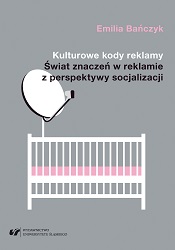Kulturowe kody reklamy. Świat znaczeń w reklamie z perspektywy socjalizacji
Cultural advertising codes. The world of meaning in advertising from the perspective of socialization
Author(s): Emilia Bańczyk (Kałuzińska)
Subject(s): Social Sciences, Language studies, Language and Literature Studies, Media studies, Theoretical Linguistics, Applied Linguistics, Communication studies, Western Slavic Languages
Published by: Wydawnictwo Uniwersytetu Śląskiego
Keywords: media socialization; advertising; child
Summary/Abstract: The purpose of my dissertation is the reconstruction of socialization offer of advertising. The choice of this topic involves contemporary cultural transformations and results from observation that the process of entering an individual to society is more often accompanied by the media, and with the recognition that advertisement has a meaningful impact in today’s world – as the transfer of general social knowledge. These two concepts: socialization and advertising become description subject in the theoretical part of the thesis.
Television has become an important factor of socialization, as the research indicates, which shows that the average nursery school child watches television up to three hours a day. Young viewers like to watch advertisments, they are also the extremely absorbent audience and prolong the existence of commercial messages, drawing from them inspiration for fun and for the children’s folklore. To evaluate the potential of the socialization of advertising, I analyse advertising spots broadcast on channel TVP ABC. Children as recipients of fables become here automatically receivers of many advertising messages. Arousing children’s interest advertising has the potential to shape the image of the world’s youngest viewers, providing knowledge about products, but also about values, stereotypes or social roles. In this way conceptualization of reality from advertisments can be internalized by the child audience.
Advertising as a multicode, polisemiotic message, requires also multidimensional description. I am ordering the collected material using content analysis – taking into consideration the category of advertised products, as well as promoted in spots values and social roles in which the main ads character are being occupied. Then I am taking a closer look to the selected advertisement and doing their semiological analysis, to check how a single spots in its plots reproduce the social order and in what way modify it. Finally, I am studing advertising spoken texts, supporting with the concept of the Lublin school of ethnolinguistics, I am trying to reconstruct an linguistic picture of the world carried by the advertisements.
Reconstruction of advertising socialization offer shows that advertising equates children recipient with an adult, presenting post consumption world where dreams are realized through loans. Picture of the social roles is filled with stereotypes, however, we can notice some elements of changes, ie. fathers taking care of children or active female character presented away from home. The meaning of advertisements creates three pragmatic areas: CONSUMPTION AREA, UNLIMITED POSSIBILITIES AREA and EXISTENCE AREA. The child learns from advertising texts that „new is better”, that it can do in life, whatever it wants, and, that life is inseparably connected with money, while home and family are disconnected.
Series: Językoznawstwo
- E-ISBN-13: 978-83-226-3456-1
- Print-ISBN-13: 978-83-226-3455-4
- Page Count: 226
- Publication Year: 2018
- Language: Polish
- eBook-PDF
- Table of Content
- Introduction

